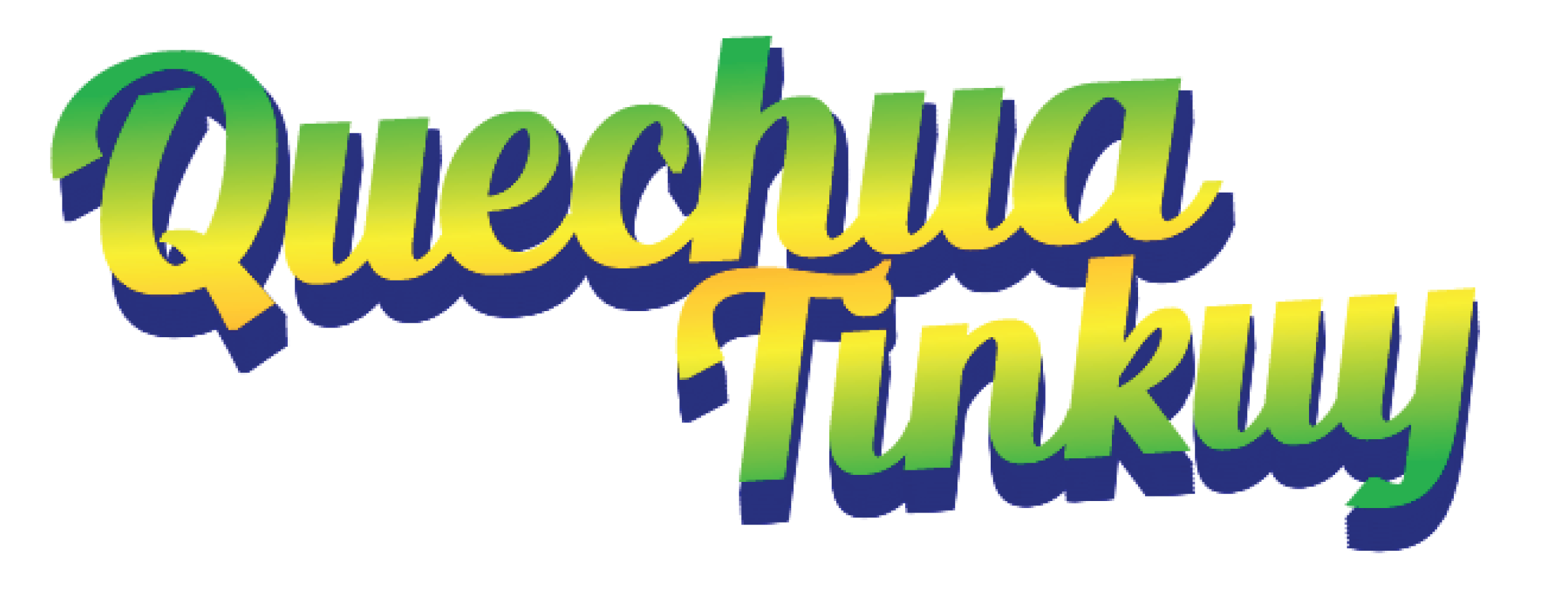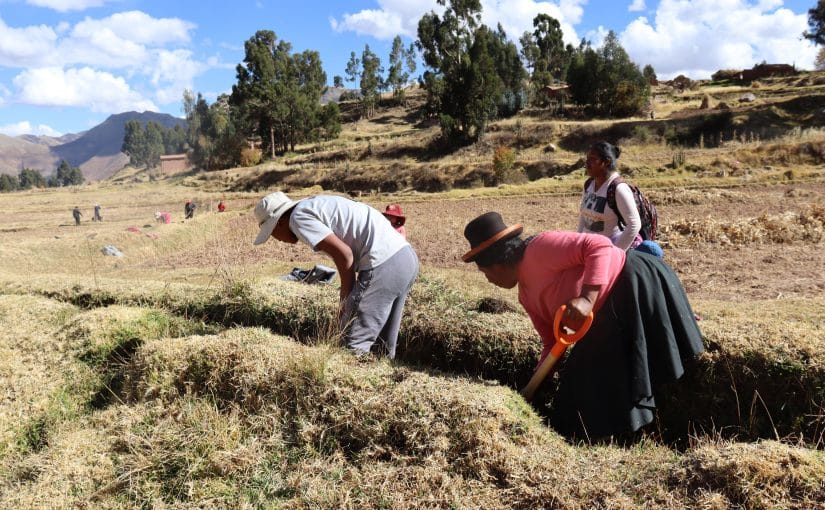
Qallarinapaq | Introduction
In this unit you will learn the future tense in Quechua, differently than the past tense which uses the suffixes ra or rqa, the future tense uses different verbal endings according to the personal pronoun, let's look at the following examples:
Ñuqa wayk’u-saq (I will cook)
Qan wayk’u-nki (You will cook)
Pay wayk’u-nqa (He, she will cook)
Ñuqanchis wayk’u-sunchis (We will cook)
Ñuqayku wayk’u-saqku (We will cook)
Qankuna wayk’u-nkichis (You will cook)
Paykuna wayk’u-nqaku (They will cook)
Ready?
¡Qallarisun! / Let's get started!

Qillqa | Grammar
Each personal pronoun has a different verbal ending. Observe the following chart and pay attention to each of the personal verbal markings such as: como: saq, nki, nqa, sunchis, saqku, nkichis, nqaku. We will conjugate the verb with these. tusuy (to dance)
Infinitive verb: tusuy
Verbal root: tusu
| Note: Remember that the use of the dashes (-) are not part of Quechua writing, they are used to separate the grammatical structure for a better reading and understand for the student. |
| Future tense | English |
| I will dance | |
| You will dance | |
| She/he will dance | |
| We will dance (including the listener) | |
| We will dance (excluding the listener) | |
| You will dance | |
| They will dance |
In the following graphic we will conjugate the verb pukllay (to play), pay attention to the future tense marker (which is in green).
Verb pukllay (to play)
Singular – Ch’ulla
| I | Nuqa puklla-saq |
| You | Qan ka-shanki |
| She/He/It | Pay puklla-nga |
Plural – Ashka
| We (inclusive) | Ñuqayku puklla-sunchis |
| We (exclusive) | Ñugayku puklla-sagku |
| You (plural) | Qankuna puklla-nkichis |
| They | Paykunapuklla-nqaku |
Next, we will look at the following examples of the future tense in Quechua.
Conjugation of the verb qelqay (to write):
Infinitive verb: qelqay
Verbal root: qelqa
Singular – Ch’ulla
| Ñuqa qelqa-saq | I will write |
| Qan qelqa-nki | You will write |
| Pay qelqa-nqa | She/he will write |
Plural – Ashka
| Ñuqanchis qelqa-sunchis | We (inclusive) will write |
| Ñuqanchis qelqa-sunchis | We (exclusive) will write |
| Qankuna qelqa-nkichis | You will write |
| Paykuna qelqa-nqaku | They will write |
Now we will conjugate the verb tarpuy (to sow):
Infinitive verb: tarpuy
Verbal root: tarpu
Singular – Ch’ulla
| Ñuqa tarpu-saq | I will sow |
| Qan tarpu-nki | You will sow |
| Pay tarpu-nqa | She/he will sow |
Plural – Ashka
| Ñuqanchis tarpu-sunchis | We (inclusive) will sow |
| Ñuqayku tarpu-saqku | We (exclusive) will sow |
| Qankuna tarpu-nkichis | You will sow |
| Paykuna tarpu-nqaku | They will sow |
Let's look at more examples conjugating the future tense in Quechua with the actions that you see in the photos.
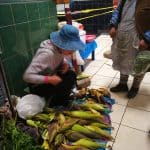
Ñuqa choqllota ranti-saq
I will buy corn cobs
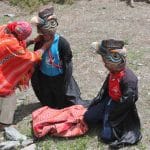
Qan tusu-nki
You will dance
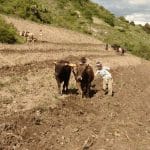
Pay sarata tarpu-nqa
She/he will sow corn
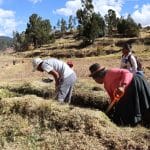
Ñuqanchis faenapi llank’a-sunchis
We will work on the chores
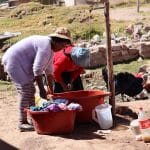
Ñuqayku pachata t’aqsa-saqku
We will wash the clothes
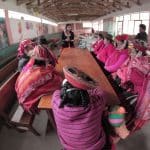
Qankuna salonpi tupa-nkichis
You will find each other in the salon
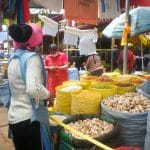
Paykuna mercaduta ri-nqaku
They will go to the market
Next, listen closely to the following conversation between Timoteo and Dionisia:
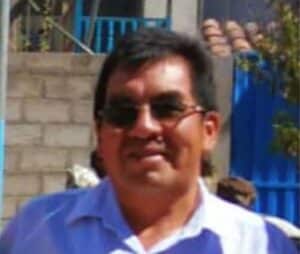
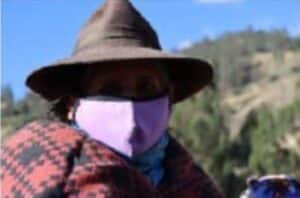
Timoteo: ¿Imaynallan kashanki panay Dionisia?
Dionisia: Allillanmi turay Timoteo ¿Qanri?
Timoteo: Allillanmi kashani panay. ¿Imata ruwa-nki kunan p’unchay?
Dionisia: Kunan p’unchay michi-saq llamaykunata turay ¿Qanri?
Timoteo: Ñuqa sarata tarpu-saq chaqraypi panay.
Dionisia:Kusa, kusa turay. Tupananchiskama.
Timoteo: Tupananchiskama panay. Michiy llamaykikunata.
To better understand the context of the future tense it is important to know the principal divisions of time.
Note: If you want to expand on this information we invite you to revisit Yachana 6 P´unchaykunaq Sutin (P’unchawkuna): Days of the Week.
| Quechua | English |
|---|---|
| Day | |
| Today | |
| Today | |
| Tomorrow | |
| Yesterday | |
| Past days | |
| The day after tomorrow | |
| Noon | |
| Afternoon | |
| Night | |
| Next year | |
| Next month | |
| Last year | |
| This year |
Closely read the following sentences in the future. Pay attention to the accusative marker «ta», locative suffix «pi» and future verbal markers for each personal pronoun like: saq, nki, nqa, sunchis, saqku, nkichis, nqaku. For this, take into account the following tables.
“TA”
It is an accusative marker that indicates direct object.
“PI”
This is a suffix that indicates temporality or place. For example, Texaspi ("in Texas" or "of Texas"), Kamay Raymi Killapi ("In January" or "Of January").
“TA“SAQ, NKI, NQA, SUNCHIS, SAQKU, NKICHIS, NQAKU»
Each personal pronoun has a different verbal marker to indicate the future.
Next, let's look at more examples that combine the accusative marker "ta", locative suffix "pi", and the future verbal markers: saq, nki, nqa, sunchis, saqku, nkichis, nqaku.
(Ñuqa) Texaspi hamuq wata lingüística-ta yacha-saq.
Next year I will learn linguistics in Texas.
(Qan) Qosqopi hamuq wata waynu-ta tusu-nki.
Next year you will dance Wayno in Cusco.
(Pay) Sara-ta kay wata tarpu-nqa.
This year he/she will sow corn
(Ñuqanchis) Quechua-ta kunan p’unchay yachachi-sunchis. (Inclusive)
Today we will teach Quechua.
(Ñuqayku) Apurimacpi kunan p’unchay futbol-ta puqlla-saqku. (Exclusive)
Today we will play soccer in Apurímac.
(Qankuna) Matematica-ta hamuq watakunapi istudia-nkichis.
In the next years you all will study mathematics.
(Paykuna) Estados Unidospi kay wata Inglis-ta yacha-nqaku.
This year they will learn English in the United States.
Next, we will learn the term «chaymantataq» which refers to "next, after", this term serves a connector when we narrate main activities we will do in the future, pay attention to the suffix SAQ (of the first person) that indicated the future, for example:
¿Imata-taq hamuq watakuna ruwasaq? (What will you do next year?):
Ñuqa Sicuani llaqtayman risaq taytamamaywan tupanaypaq
CHAYMANTATAQ maestriayta hatun yachaywasiypi tukusaq
CHAYMANTATAQ doctoradutapas tukusaq
CHAYMANTATAQ huk mosoq carruta rantisaq
CHAYMANTATAQ liwruy qelqayta qhallarisaq
CHAYMANTATAQ Sicuanipi qosaywan wasichakusaqku
CHAYMANTATAQ huk hatun chakrata rantisaq
CHAYMANTATAQ chakraypi papata, sarata, quinuata, habastawan tarpusaq
CHAYMANTATAQ qosaywan wawaykunata yanapasaqku.
CHAYMANTATAQ Asia suyukuna riqsiq risaq
CHAYMANTATAQ aylluyta yanapasaq atisqayta
I will go to Sicuani to help my parents,
THEN I will finish my master's in the university
THEN I will finish my doctorate
THEN I will buy a new car
THEN I will write a book
THEN my husband and I will build our own house in Sicuani
THEN I will buy a big chakra
THEN I will sow potatoes, corn, quinoa, and fava beans in the chakra
THEN my husband and I will help our kids
THEN I will go to visit Asia
THEN I will help my community.

Rimanakuna | Vocabulary
| Qelqay | to write |
| Tarpuy | to sow |
| Rantiy | to buy |
| Faena | collective work |
| P’acha | clothing |
| T’aqsay | to wash |
| Tupay | to meet |
| Riy | to go |
| Michi | cat |
| Paqarin | tomorrow |
| Qowi | guinea pig |
| T’ipiy | to shuck |
| Killa | month |
| Pallay | to harvest |
| T’anta | bread |
| Chiwchi | small chicken |
| Qhatuy | to sell |

Ruwapakuy | Exercises
Now we will practice what we learned in this unit, pay attention to the following:
- locative suffix «pi» which indicated temporality or place (Californiapi – in California, from California).
- Accusative marker «ta» the indicates direct object (for more detail, see Unit 8) for example: trigo – triguta, fútbol – futbolta, papa – papata, wasi – wasita.
- Verbal markers that indicate the future for each personal pronoun: saq, nki, nqa, sunchis, saqku, nkichis, nqaku.
Next, read each sentence and fill in the blanks:
ÑUQA (KA-SAQ) / I WILL BE
(Ñuqa) Limapi Quechua-ta yacha-saq hamuq wata.
Next year I will teach Quechua in Lima.
Let's look at more examples and in your notebook write what they mean:
(Ñuqa) Qquehuarpi tiyasaq hamuq wata.
__________________________________________
(Ñuqa) Puca Pucapi triguta tarpusaq hamuq killa.
____________________________________________________
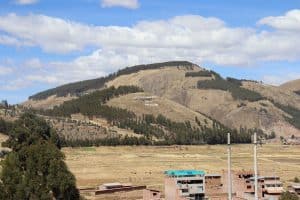
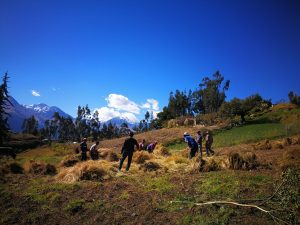
QAN KA-NKI / YOU WILL BE
(Qan) wasipi wallpa-ta wayk’u-nki paqarin.
Tomorrow you will cook chicken in the house.
Let's look at more examples and in your notebook write what they mean and fill in the blanks with the corresponding phrase:
(Qan) faenapi __________ minchha p’unchay.
You will help with the chores the day after tomorrow.
(Qan) qowita mikhuchiy.
_________________________________
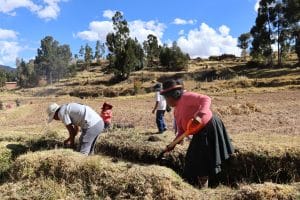
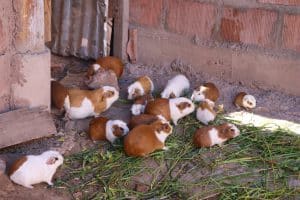
PAY (KA-NQA) / HE, SHE WILL BE
(Pay) wasinpi tareanta ruanqa paqarin.
She/he will do her/his homework in her/his house tomorrow.
Let's look at more examples and in your notebook write what they mean and fill in the blanks with the corresponding phrase:
(Pay) Intiraymipi ________.
She/he will dance at Intiraymi.
(Pay) estofadota wayk’unqa.
_____________________________
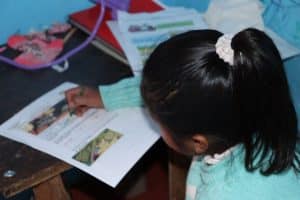
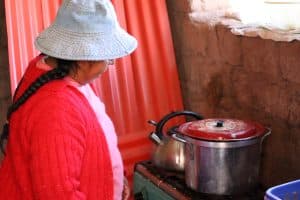
PAYKUNA KA-NQAKU / THEY WILL BE
(Paykuna) Abancay-ta kay wata ri-nqaku.
They will go to Abancay this year.
Let's look at more examples and in your notebook write what they mean and fill in the blanks with the corresponding phrase:
(Paykuna) Curahuasipi sarata ___________.
We will harvest corn in Curahuasi.
(Paykuna) Antapi _________ __________ hamuq wata.
Next year we will buy cows in Anta.


Answers
(Paykuna) Curahuasipi sarata t’ipinqaku.
We will harvest corn in Curahuasi.
(Paykuna) Antapi wakakuna rantinqaku hamuq wata.
Next year we will buy cows in Anta.
ÑUQANCHIS KA-SUNCHIS/WE WILL BE (INCLUSIVE)
(Ñuqanchis) papa-ta mikhu-sunchis.
We will eat potato..
Let's look at more examples and in your notebook write what they mean and fill in the blanks with the corresponding phrase:
(Ñuqanchis) pachata __________ paqarin.
We will wash the clothes tomorrow.
(Ñuqanchis) mercadupi aqhata rantisunchis.
We __________ chicha in the market.
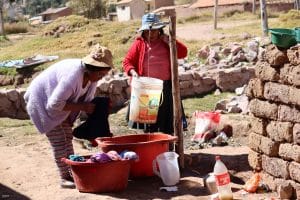
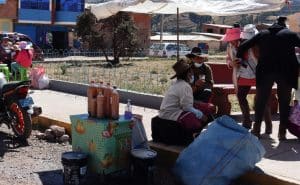
Answers
(Ñuqanchis) pachata t’aqsasunchis paqarin.
We will wash the clothes tomorrow.
(Ñuqanchis) mercadupi aqata rantisunchis.
We will buy chicha in the market.
ÑUQAYKU KA-SAQKU / WE WILL BE – EXCLUSIVE
(Ñuqayku) waynu-ta taki-saqku.
We will dance huayno.
Let's look at more examples and in your notebook write what they mean and fill in the blanks with the corresponding phrase:
(Ñuqayku) __________ waynukunata __________ Agustu killapi.
In the month of August we will dance huayno in Apurimac.
(Ñuqayku) Urubambapi fresata pallasaqku kunan p’unchay.
We _________ strawberries in Urubamba _________.
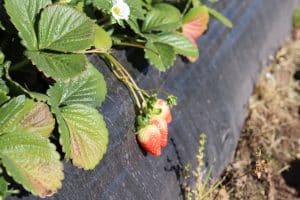

Answers
(Ñuqayku) Apurimacpi waynukunata tususaqku Agustu killapi.
In the month of August we will dance huayno in Apurimac.
(Ñuqayku) Urubambapi fresata pallasaqku kunan p’unchay.
We will harvest strawberries in Urubamba today.
QANKUNA KA-NKICHIS / YOU WILL BE
(Qankuna) t’anta-ta kunan tuta mikhu-nkichis.
You all will eat bread tonight.
Let's look at more examples and in your notebook write what they mean and fill in the blanks with the corresponding phrase:
(Qankuna) mercadupi _______ qhatunkichis.
We will sell quinoa in the market.
(Qankuna) ________ chiwchikuna __________ .
We will buy chicken in the market.
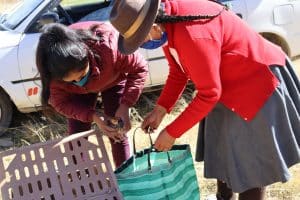
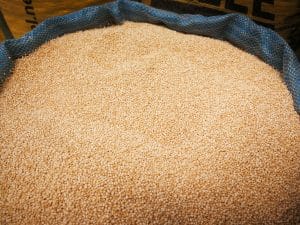
Answers
(Qankuna) mercadupi quinuata qhatunkichis.
We will sell quinoa in the market.
(Qankuna) feriapi chiwchikuna rantinkichis.
We will buy chicken in the market.
